
The 3 Key Steps to Reach Any Weight Loss Goal 10x Faster

How do you stay focused on your goals?
In other words, you may have tons of goals you’re working on, whether they’re fitness goals, financial goals, relationship goals or travel goals, but then you go on Youtube or you go on Instagram and you get side tracked.
All this stuff gets thrown in your face all of a sudden.
How are you supposed to stay on track with a million distractions fighting for your attention?
The 3 Steps to Staying the Course with Fitness Goals
Focus is the million dollar quality in today’s world.
In all of human history, there has never been a time where people are thrown some much data, so much information at their brain that they have to process, and as a result, I believe that we have lowest attention span in recorded history.
Now let’s quickly walk through my process for staying focused on goals.
Not necessarily setting the goals themselves, but staying focused and consistent with the process (which is where we often get sidetracked).
Habit #1: The Hidden Power of Writing Down Your Fitness Goals

Yes, I really have my goals written down on paper, and I keep it in my phone case.
The first thing, the very first thing that I’ve talked about here, is that I review my goals twice daily.
I’ve already shown you that particular video before, where I talked about my doomsday document – if all my life implodes, these are the habits I do on a daily basis.
The other thing was that I showed you my goal sheet that I pulled out of the back of my phone and I carry with me every single day, anywhere in the world, so that I can know exactly what I’m working towards.
If you know your trajectory, the health, finances, life, the girl or the guy, where you want to live – it’s only a matter of time before you get there, because you’re looking at it every single day. You know where the “x” is on the map.
It’s very easy. Whereas the most people don’t even know what they’re waking up in the morning for, if you wake up, pull out the sheet of paper that has the picture of how you want to look and feel, how can you not make progress?
The average person has no clue what they want, and as a result it doesn’t really matter how hard they work.
Habit #2: The Ultimate Way to Remind Yourself Of The Goal
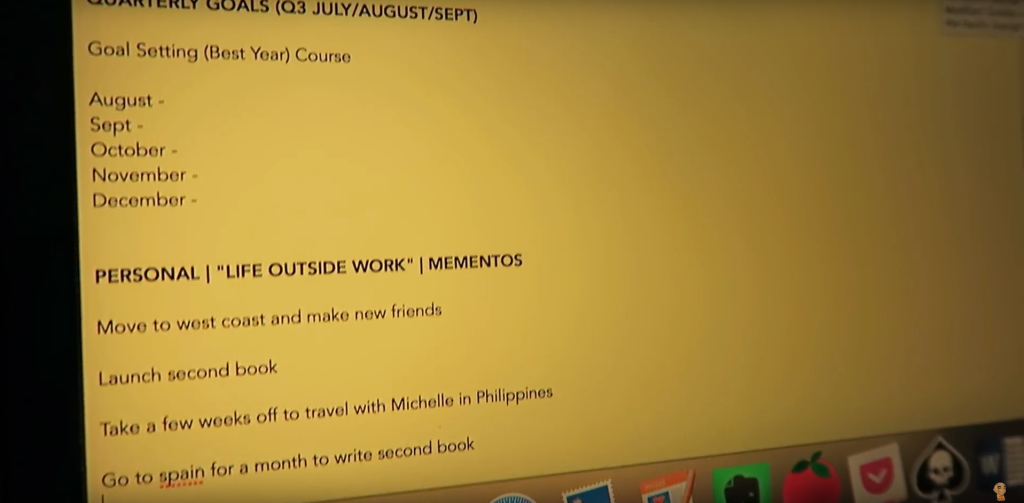
The second thing I use to stay consistent is the following: I use the “notes” app on my computer, and in particular, I set it so that it automatically opens when I start my computer.
I swipe over to a separate window and I have my goals listed out there.
One of the things that I never do is just list my own fitness goals for example. A couple years back I found that I was becoming very one-sided in my goals (for example, being overly career oriented).
Now, I have a personal rule that I have to set goals (even if they’re tiny) in each aspect of my life.
That way, I can guarantee that not only is my fitness improving, but so is my relationship, my ability to handle stress, and more.
What I do on this sheet is I set aside my primary goal for the quarter, and then I set aside the other goals that I’m working on.
That’s my second layer of accountability – it’s what keeps me focused each day.
Habit #3: Creating a Yearly Vision That Keeps You on Track (Way After The New Year)
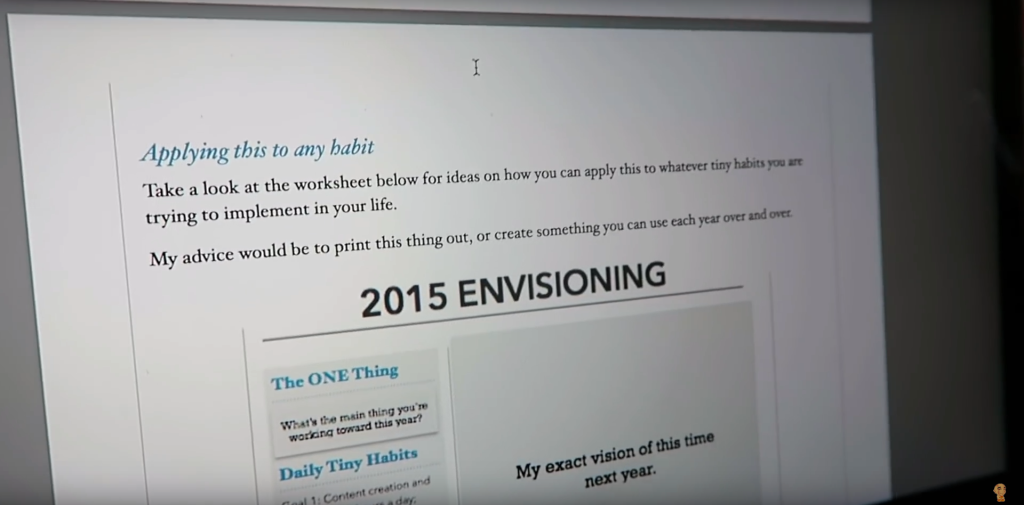
The third habit is a “top secret” habit I learned from productivity and personal development teachers.
It’s my one page yearly visualization.
My yearly envisioning document, as I call it, I create at the beginning of each year.
When most people are setting their goals, I actually put together this sheet which is a more in-depth version of just plain old goal setting.
This sheet is for the explicit purpose of focus. At the top of the sheet I write down exactly what my primary goal is.
My one goal for the year. Since I no longer just set single goals in my life (remember: set goals in every aspect of life), I typically limit it to three now.
One could be health, one could be relationships, one could be career.
I have that on this sheet, and from there what I actually do is I write down – hour by hour – what are the daily habits that I’m going to be working on.
The goal may be to lose 20 pounds or to write my first book, but that doesn’t help me actually execute it and get there. In order to actually get there, I write down two other things.

If the goal is to lose 20 pounds, it comes back to the daily habit philosophy I’ve talked about in my book, Master the Day.
I really do live by this, because if you want to lose weight, but you have to bring it back to the day.
How do you make today perfect?
“Okay, I’m going to track my food.”
“Okay, I’m going to do four workouts a week.”
I have my hourly habits listed there.
Again, the goal is only for the purpose of listing the daily habits.
After then, I can basically delete the goal, because it doesn’t matter. Because if you do the daily things, you’re going to get to the endpoint that you want.
The other thing is I write out every little detail of the perfect year.
For example, this year I’ve moved to the West Coast, because I’m studying Chinese medicine and essentially starting my life over in one aspect.
So even though I set my own health and fitness goals, I also put down other simple goals in my visualization of the “perfect” year: making new friends, exploring new coffee shops and finding local interest spots.

I wrote down how I wanted my relationship to be with my girlfriend, and my mom and dad, and my siblings.
All of this stuff. I wrote down the visualization, so that I could literally read it out in the morning, close my eyes, read it out loud, and already see the next year going perfectly.
Finally, to focus on the right goals, I set aside those time blocks like I’ve mentioned.
The value of setting aside blocks of time is all about reverse engineering the goal like we talked about: the goal just serves to help us figure out the daily habits we need.
Then we need to put those habits into the calendar so there is no excuse for not doing them.
For me, what tends to work best is setting aside the first hour of each morning to work on that particular goal.
This might work for you if you’re a morning person, or it might not. For me the most important thing is that it’s in the freaking calendar.
Every damn day. If the goal’s a daily habit, every damn day it should be somewhere on the calendar.
That’s what I did for exercise, that’s what I did for writing my book, and that’s what I do for all the other habits I’m working on.
Let’s use this specific example now.
How to Use The 3-Phase Consistency Process For A New Habit (Like Meditating)
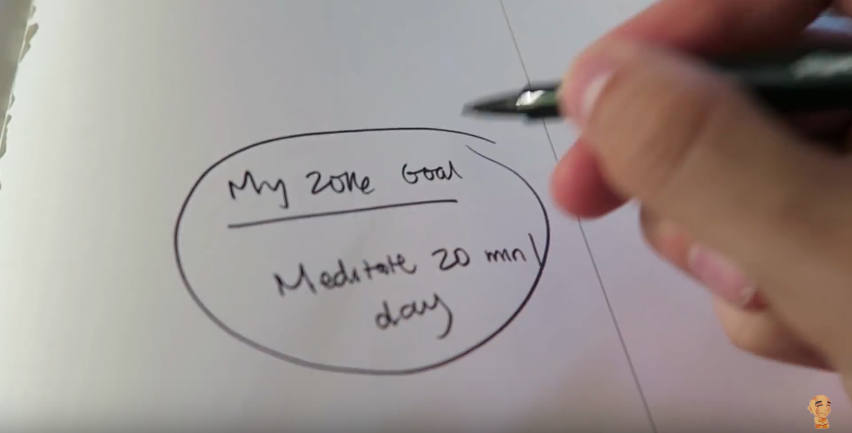
If you wanted to become a regular meditator, and that was your primary goal for 2016, how would you go about doing this?
First thing of course, is to get back to that daily goal sheet. Write down what your daily habits going to be.
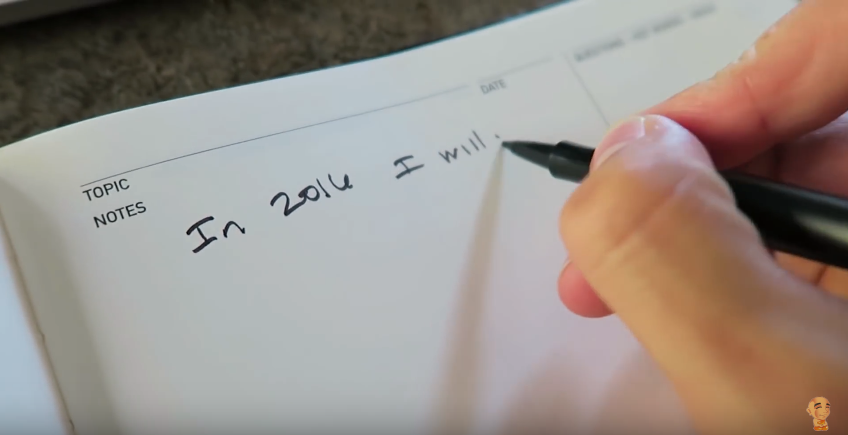
Meditating 20 minutes twice a day. That could be the goal for example.
Second thing, use the sticky note app. If you have a Mac, or if you don’t, put it as your phone background.
Write it on a piece of paper, take a picture, and then put it as your background. I meditate 20 minutes twice per day.
The third thing – do the yearly envisioning document. Write down exactly what it looks like, in visualization, guided meditation format:
I wake up 20 minutes before school, before work, and I meditate for 20 minutes.
I feel calm, I feel awesome, I don’t go into work stressed out and angry. Life is just smoother and a lot easier than it ever has been.
Then finally, set a reminder if you can daily, or if you have a habit tracking app, set that to remind you every single day: 7am, 9am, 9pm, your lunch break, etc.
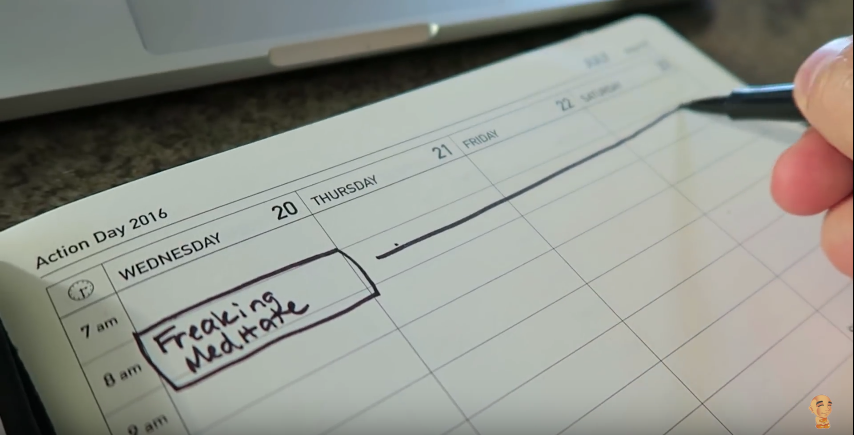
Set the daily reminder, so that you’re actually focusing on the right goal and you’re not getting distracted by all these other things that come up in the day to day whirlwind of life.
That reminder obviously serves as your time block.
If you’re someone who has a really scheduled routine, then you need to put that in there just as important as going to class or going to work or doing whatever else needs to be on your calendar in life.
If picking up your kids is on your calendar, then so should meditating, exercising, or going to that group class.
Just the power of putting that habit directly into your calendar is such a fail-proof habit – what gets scheduled and written down, get’s done.
Your “Master The Day” Tiny, Daily Habit

Before you go I want you to leave a quick comment right there below.
Let me know, for you specifically, what is the hardest part about staying focused? I know there are distractions, and we all have them, but for you, what’s the biggest distraction to staying focused on your particular goals?
Leave a comment below.
-Alex
Images: Some used with permission from freedigitalphotos.net
